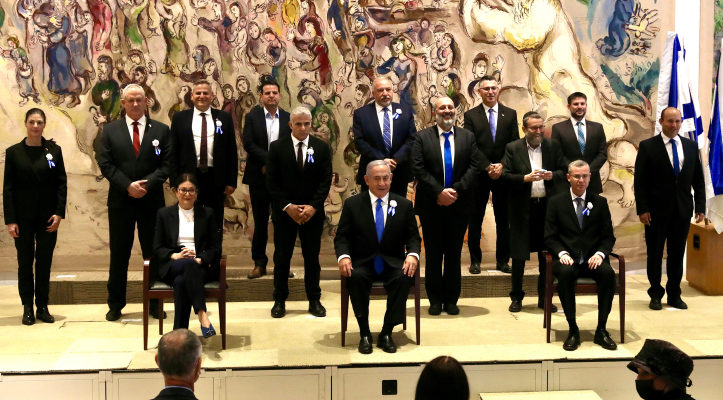Prime minister has tough challenge to find enough partners for a coalition government before the 28-day deadline expires.
By Paul Shindman, World Israel News
Prime Minister Benjamin Netanyahu began the daunting task Wednesday of trying to form a new coalition government in the wake of last month’s inconclusive national election.
After receiving the mandate from President Reuven Rivlin to form a government, Netanyahu is expected to meet with the leaders of the Shas and United Torah Judaism parties in the ultra-Orthodox bloc to discuss with them the possibilities of forming a government.
Netanyahu is expected to meet with right-wing Yemina Party chairman Naftali Bennett on Thursday evening in a bid to convince him to join the coalition.
Rivlin selected Netanyahu despite the incumbent leader having the support of only 52 of the 120 members of the Knesset, Israel’s parliament. Opposition leader Yair Lapid of the centrist Yesh Atid party received 45 recommendations, while Bennett received 7 and three parties representing the remaining 16 seats told Rivlin they were not recommending any specific leader.
With political animosity running high, Netanyahu is being given only a slim chance of convincing Bennett to join him, as it still leaves Netanyahu two seats short of the 61 needed for a majority in the Knesset.
“Netanyahu has two main tasks in the next four weeks: one on offense and one on defense,” said Channel 12 political affairs correspondent Amit Segal. “On the offensive side, Netanyahu’s goal is to put heavy pressure on the chairman of Religious Zionism, Bezalel Smotrich … to persuade him and his party members to go to the right-wing government with the support of the Arab-Islamic Ra’am [party] – a scenario that Smotrich has repeatedly rejected several times in recent days.”
The possibility of Netanyahu using the support of the Islamist Ra’am party has been discussed repeatedly as his only chance of maintaining power, as the other small parties have repeatedly stated they intend to replace Netanyahu with an alternative coalition that could see Bennett and Lapid taking turns as prime minister.
Bennett is “dancing at two weddings,” Segal said, pursuing the option of joining Netanyahu or forming a government of change alongside Lapid, a move that has given rise to harsh criticism that the leader of an avowed right-wing party (Yemina in Hebrew means “right”) would sit in a government dependent on small left-wing parties.
“From a defensive point of view, Netanyahu foresees a situation in which he will not be able to form a government – and he is already thinking about how he can block Bennett from forming a rotating government together with Yair Lapid, especially if this happens with the support of Ra’am,” Segal noted.
For his part, Bennett was quoted as saying he was waiting for the 28-day deadline to expire.
“After Netanyahu fails – I will form a government with Lapid,” Bennett reportedly said in closed-door comments reported by Channel 13. Earlier Tuesday, Bennett said in a speech that he desired a right-wing government, a statement that deepened the gaps between him and the parties hoping to unite with Lapid.
But Netanyahu is determined to hammer out a coalition, even if that means having to rely on the four seats of Ra’am, which is aligned with the Islamist movement in Israel.
In remarks to the Likud caucus, Netanyahu told his party members the electorate chose Likud, which received 30 seats, as the largest party “by a huge margin from any other party.” Lapid’s Yesh Atid won 17 seats and the 11 other parties in the Knesset all have fewer than 10 seats each.
Netanyahu said that in order to form a coalition of at least 61 seats, “we must stop the boycotts and personal disqualifications,” in a veiled reference to objections from Likud members and others that he not depend on the support of Ra’am.
To help Netanyahu, the ultra-Orthodox parties Shas and United Torah Judaism are expected to use the Council of Torah Scholars to push the rabbis in the Religious Zionism party to convince Smotrich to sit in a Netanyahu-led government with the support of Ra’am.





